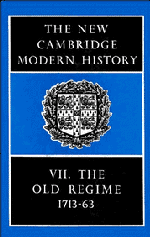Book contents
- Frontmatter
- CHAPTER I INTRODUCTORY SUMMARY
- CHAPTER II THE GROWTH OF OVERSEAS COMMERCE AND EUROPEAN MANUFACTURE
- CHAPTER III THE SOCIAL CLASSES AND THE FOUNDATIONS OF THE STATES
- CHAPTER IV THE VISUAL ARTS AND IMAGINATIVE LITERATURE
- CHAPTER V THE ENLIGHTENMENT
- CHAPTER VI RELIGION
- CHAPTER VII MONARCHY AND ADMINISTRATION
- CHAPTER VIII THE ARMED FORCES AND THE ART OF WAR
- CHAPTER IX INTERNATIONAL RELATIONS
- CHAPTER X THE DECLINE OF DIVINE-RIGHT MONARCHY IN FRANCE
- CHAPTER XI ENGLAND
- CHAPTER XII THE WESTERN MEDITERRANEAN AND ITALY
- CHAPTER XIII THE ORGANISATION AND RISE OF PRUSSIA
- CHAPTER XIV RUSSIA
- CHAPTER XV SCANDINAVIA AND THE BALTIC
- CHAPTER XVI POLAND UNDER THE SAXON KINGS
- CHAPTER XVII THE HABSBURG DOMINIONS
- CHAPTER XVIII THE WAR OF THE AUSTRIAN SUCCESSION
- CHAPTER XIX THE DIPLOMATIC REVOLUTION
- CHAPTER XX THE SEVEN YEARS WAR
- CHAPTER XXI THE DEVELOPMENT OF THE AMERICAN COMMUNITIES
- CHAPTER XXII RIVALRIES IN AMERICA
- CHAPTER XXIII RIVALRIES IN INDIA
- CHAPTER XXIV ECONOMIC RELATIONS IN AFRICA AND THE FAR EAST
- References
CHAPTER X - THE DECLINE OF DIVINE-RIGHT MONARCHY IN FRANCE
Published online by Cambridge University Press: 28 March 2008
- Frontmatter
- CHAPTER I INTRODUCTORY SUMMARY
- CHAPTER II THE GROWTH OF OVERSEAS COMMERCE AND EUROPEAN MANUFACTURE
- CHAPTER III THE SOCIAL CLASSES AND THE FOUNDATIONS OF THE STATES
- CHAPTER IV THE VISUAL ARTS AND IMAGINATIVE LITERATURE
- CHAPTER V THE ENLIGHTENMENT
- CHAPTER VI RELIGION
- CHAPTER VII MONARCHY AND ADMINISTRATION
- CHAPTER VIII THE ARMED FORCES AND THE ART OF WAR
- CHAPTER IX INTERNATIONAL RELATIONS
- CHAPTER X THE DECLINE OF DIVINE-RIGHT MONARCHY IN FRANCE
- CHAPTER XI ENGLAND
- CHAPTER XII THE WESTERN MEDITERRANEAN AND ITALY
- CHAPTER XIII THE ORGANISATION AND RISE OF PRUSSIA
- CHAPTER XIV RUSSIA
- CHAPTER XV SCANDINAVIA AND THE BALTIC
- CHAPTER XVI POLAND UNDER THE SAXON KINGS
- CHAPTER XVII THE HABSBURG DOMINIONS
- CHAPTER XVIII THE WAR OF THE AUSTRIAN SUCCESSION
- CHAPTER XIX THE DIPLOMATIC REVOLUTION
- CHAPTER XX THE SEVEN YEARS WAR
- CHAPTER XXI THE DEVELOPMENT OF THE AMERICAN COMMUNITIES
- CHAPTER XXII RIVALRIES IN AMERICA
- CHAPTER XXIII RIVALRIES IN INDIA
- CHAPTER XXIV ECONOMIC RELATIONS IN AFRICA AND THE FAR EAST
- References
Summary
During the period extending from the sixteenth to the eighteenth century monarchy in most of the States of western and central Europe represented a compromise between medieval and modern conceptions of government; medieval ideas of the divine sanction of kingship were combined with an increasingly absolute form of rule. This phase in the history of European polity reached the completest development possible within its own limits in France. In his capacity as a Divine-Right monarch, Louis XIV embodied a tradition that went back to the rois thaumaturges; but the rays that darted from the roi soleil were not the effulgence of a setting sun. The new absolutism, allied to the old Divine Right, had given the French monarchy a renewed and more vigorous life. It must be remembered that the effete and decadent system of 1789, the ancien régime of the historians, only a century before was the new deal of Louis XIV and Colbert. At the close of the seventeenth century, by the efficiency of its administrative and governmental structure, France was in advance of every other country in Europe. True, Louis XIV did not leave his country at the height of her greatness. He outlived his own glory both at home and abroad and bequeathed more problems than solutions to his successors. In France distress and discontent were widespread before he died; and in Europe, during his long reign, Louis had first used and then abused the power with which the cardinals had endowed France, until the Treaty of Utrecht registered his defeat and opened what has been called, though hardly with justice, the age of ‘the English preponderance’.
- Type
- Chapter
- Information
- The New Cambridge Modern History , pp. 214 - 240Publisher: Cambridge University PressPrint publication year: 1957
References
- 2
- Cited by



